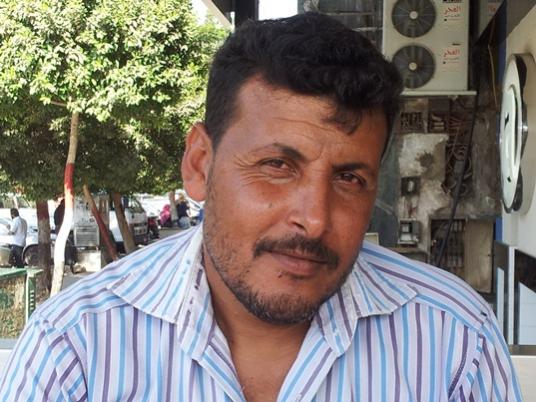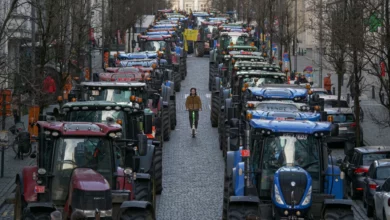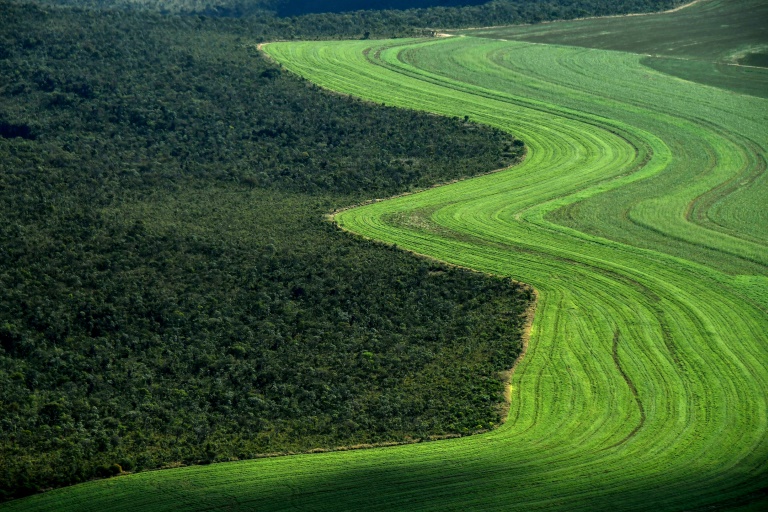
Reda Mohamed Nassif, a farmer from Madinat al-Sadat, was a victim of land reclamation and rural violence during the Hosni Mubarak era. He was also one of the farmers who protested in front of the Interior Ministry on 27 August to ask for their rights in defending their lands.
These farmers plan to gather for another strike until President Mohamed Morsy listens to their demands.
Nassif spoke with Egypt Independent about farmers’ circumstances and what he calls “the new feudalism.”
Egypt Independent: Generally speaking, what are the main problems that face small farmers nowadays?
Reda Mohamed Nassif: Farmers nowadays aren’t just treated as second-class citizens. I think they are treated as 10th class citizens who don’t have any rights to complain or to protect their lands. We are facing a lot of problems but the biggest one of them is discrimination.
The government sells desert and agriculture lands to the businessmen and the companies while refusing to sell or rent them to the small farmers. Pesticides and fertilizers are one of the main problems, because the agricultural committee provides peasants with very small amounts that don’t cover the annual requirements of half an acre. Most of these fertilizers and pesticides go to rich businessmen’s lands and we resort to the black markets, which sell fake ones at very expensive prices.
As for distributing our crops, this is another disaster. There is no demand for small farmers’ crops because the large agricultural companies monopolize the local market and the export markets. They determine the prices as they like.
When international companies decide to import fruits and vegetables from Egypt, they don’t go to small farmers but to the big, well-known companies. The farmers don’t find any outlets for selling their crops and face huge losses.
Most of these small farmers depend mainly on loans from the Agricultural Development Bank to help them buy seeds and build irrigation systems. Unfortunately, they are sent to prisons when they can’t repay the loans. Therefore, most farmers decided to abandon agriculture and sell their lands, and started working in shops and factories.
EI: Why did you protest in front of the ministry and what are your complaints?
Nassif: We have been complaining and protesting for more than six years, but no one listens to us and nobody cares. We are a group of small farmers who decided to get out of our villages and go to reclaim the desert, searching for a new source of livelihood for our families.
We started reclaiming some pieces of land in Madinat al-Sadat, on the Alexandria-Cairo Desert Road. We began to cultivate this land in 2007 and spent every pound we had on digging wells, building infrastructure and buying irrigation networks and pumps.
After turning this [uncultivated land] into one of the most fertile agriculture lands in Egypt, the Housing Ministry decided to remove the crops and kick the farmers out because they want to establish golf courses and shopping malls on the land by 2035.
EI: And what did your protests result in?
Nassif: We were promised that a committee consisting of representatives from the Agriculture Ministry, the Housing Ministry, the national land use planning center and the farmers would meet in Madinat al-Sadat in order to reach a settlement.
We went to the meeting but unfortunately we didn’t find anyone except the Housing Ministry representatives, who refused to discuss the issue with us and called us terrorists and thugs. That’s why we will continue our protests again, and many farmers have decided to stop eating and drinking until President Morsy listens to our screams.
More than 5,000 families live on this land, which is the only shelter for about 25,000 people and the main source of living for about 500 day laborers. I can’t imagine that the government doesn’t pay any attention to this number of people who will be homeless after dismissing them from their lands.
EI: We heard about armed groups of thugs that steal farmers’ lands. Have you experienced any type of rural violence by thugs before?
Nassif: This is true. A lot of farmers were victims of the groups of thugs that enter lands at night and [claim] it and kick their owners out. They went to the police stations and made a lot of formal complaints, but this could never help them get their lands back.
In the last year, some thugs were sent to us trying to get us out of our lands, and that’s why we created groups of guards who watch the lands and the crops at night. We said that everything would change after the revolution, but the farmer, who was oppressed during the last 100 years, seems to be more neglected and threatened under the rule of the new regime.
EI: So what is the role of the Farmers Syndicate?
Nassif: The Farmers Syndicate doesn’t play any role in solving farmers’ problems because since it was established after the revolution in 2011, it doesn’t have any powers and it is completely marginalized. I talked to the head of the Farmers Syndicate, but he told me that he can’t do anything for me.
Thus, we decided not to rely on anyone — we will defend our lands until the last breath, and when the tractors come to remove our crops, we will stand in front of them because it’s better to die while defending our dignity than to die out of hunger.
EI: How do you see the evolution of the farmer’s status from [former President Gamal Abdel] Nasser to [ousted President Hosni] Mubarak’s regime?
Nassif: I consider the late President Gamal Abdel Nasser’s regime as the golden age of the farmers in Egypt. Nasser saved the Egyptian farmers from the total collapse they were about to reach and gave them the rights to own the land they were working on.
During Hosni Mubarak’s regime, the farmer was intended to be omitted from all the political agendas, and the new feudalism started again. Mubarak’s system opened the door for important political figures and businessmen to own huge land areas with very cheap prices, but the small farmers weren’t allowed to own anything, and this was a policy that made his rule last all these years. He intended to humiliate farmers, as they represent the majority of the Egyptians, who might interfere with his corrupt rule if their circumstances are stable.
EI: So what about the day laborers? And what are the problems they suffer from?
Nassif: The day laborers are the most oppressed class in our society, as they work for just two or three months yearly and most of time they don’t get paid. When farmers become incapable of distributing their crops, they don’t give the day laborers their financial payments because they know that they won’t be able to complain, as they don’t have any laws that guarantee their rights.
In addition, there are no precautions that protect them from work injuries. They are completely neglected.
EI: Do you think that farmers’ circumstances will prosper during Morsy’s regime?
Nassif: All presidents promise things they can’t fulfill. In Dr. Morsy’s speech, he read Prophet Mohamed’s Hadith that says, “Whoever revives a dead land should possess it.” We thought that he would help farmers to get their rights and protect their lands, but nothing changed as of now. Reforming Egypt requires that the government put the farmer as its first priority, because he is the primary pillar on which our country relies. In order to improve and develop agriculture in Egypt, the following points must be taken into consideration, in my opinion.
The government must introduce a clear exporting policy that takes over the responsibility of distributing and exporting our crops on the local and the international levels. Also, the agricultural committees must provide small farmers with the amounts of pesticides and fertilizers they need, at reasonable prices.
Because fruits and vegetables’ international markets are open, the agricultural companies prefer to plant these kinds of crops more than planting crops such as wheat, corn and rice, which are necessary for the Egyptian people’s daily meals, and this is completely wrong. In order to achieve self-sufficiency, the Agriculture Ministry should provide some agricultural guidance programs that can give instructions to the farmers about what crops to plant according to the local consumption, which can help us cover our demand and reduce our exports.
The government must encourage farmers to reclaim the deserts instead of destroying their lands. We need pensions just like other professions. Farmers need to be treated as humans and to feel safe. In brief, we need to remember again that Egypt is an agricultural country in the first place, since the pharaonic era.
Part of this piece was originally published in Egypt Independent’s weekly print edition.


